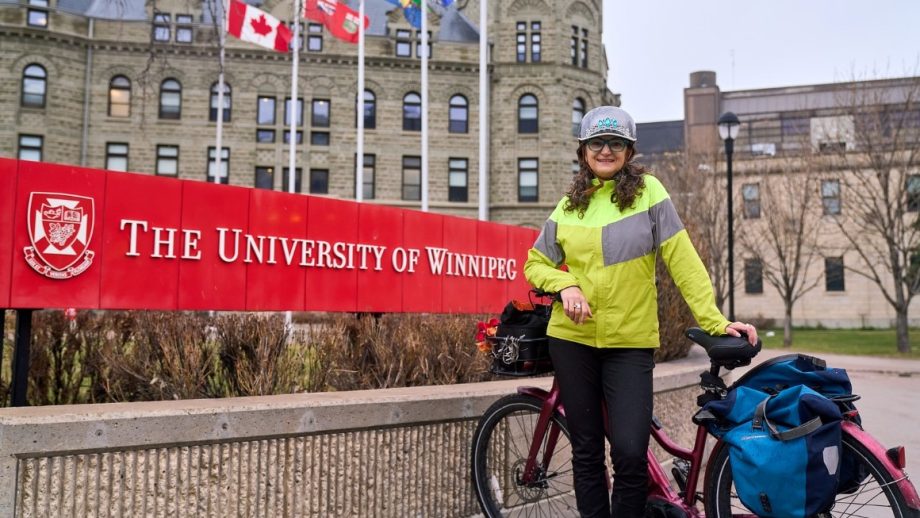PROVINCIAL BUDGET STATEMENT MARCH 12, 2018
Dr. Annette Trimbee, President and Vice-Chancellor
“Manitoba’s universities and colleges add deep value to our local economy. The Manitoba government values Return On Investment (ROI) and our ROI is demonstrably strong. Every $1 dollar invested in UWinnipeg generates approximately $15 dollars in economic activity. As a sector, Manitoba’s
post-secondaries work collaboratively and it is critically important that as a society, we continue to invest in people who are creating our knowledge economy.
We are facing some tough choices as a result of this 0.9% cut to our operating grant.
The Manitoba government has acknowledged that UWinnipeg’s operating grant is much lower than other Manitoba universities on a per-student basis. Our enrolment has increased dramatically in the past decade, but funding from government did not match the enrolment increase.
We have been doing more with less for a number of years. We have already made significant reductions in management and administrative costs beyond the 15% the province has requested of public entities. Last year we eliminated some athletic programs to achieve a balanced budget.
We will continue to make hard choices with our limited resources. Our top priorities remain investing in a strong student experience and academic excellence in teaching and research.
Our budget process is collaborative and in the coming weeks we will identify further reductions.”
BACKGROUND – DOING MORE WITH LESS
The Manitoba government has acknowledged that UWinnipeg’s operating grant is much lower than other Manitoba universities on a per-student basis. Our enrolment has increased dramatically in the past decade, but funding from government did not match the enrolment increase.
This disparity goes back decades and everyone recognizes the challenge this presents. We have had some “catch up” funding from the province ($2.5 million). We had hoped that would continue but last year that was not forthcoming.
UWinnipeg has already made significant reductions in management and administrative costs beyond the 15% the province is expecting.
It is worth noting that we have cut non-academic administrators by 25% since 2013-2014.
According to information provided by the Canadian Association of University Business Officers (CAUBO), our administration costs are lower than most Canadian universities, at just 4.3%, making UWinnipeg one of the most efficient universities in the country.
We are finding creative and collaborative ways to reduce our expenses. Some examples:
- Salaries for the senior executive team are frozen for this year and next. The senior team has accepted a wage freeze eight times in the last ten years.
- We are saving approximately $150,000 annually through voluntary days without pay
- We spent $347,000 less on utilities in 2016 compared to 2009. This represents a 23% reduction in utility costs over this period.
- Last year we made some difficult decisions and reduced the number of athletic teams we are supporting.
These are some of the steps we have taken to keep our academic core strong and focused on a high-quality student experience.
Very importantly in this era of fiscal restraint, our complement of faculty members remains stable.
Our Board of Regents will consider a more detailed one-year budget consistent with our three-year budget strategy this Spring.
BUDGET PRIMER
Last year, the Manitoba government froze our operating grant for 2017-2018, which required us to make some difficult decisions in order to balance our budget.
The Province has also passed legislation permitting tuition to increase by 5% plus inflation (6.6% this year) at post-secondary institutions.
It is important to note that the legislation states we will continue to remain below the average tuition in other Western Canadian provinces, which would mean we remain about $1,500 lower than the national average.
Tuition levels in Manitoba are the third lowest in the country. Our students pay about $2,400 less annually than the national average.
Currently, UWinnipeg awards over $4.7 million in scholarships, bursaries and other awards annually which is equal to 14% of total tuition and fees collected from undergrad and grad programs. In addition, the Awards office administers nearly $9 million in assistance from Manitoba Student Aid for UWinnipeg students. (Scholarships are based on academic achievement and bursaries are based on financial need).
We have a number of strong supports in place for students with financial need and we will be doing more.
This year approximately 1,100 students will share almost $1.2 million dollars in bursaries that we are able to provide primarily because of our generous private donors.
That is up significantly from the $768,000 bursary money we provided last year. That is due in part because of our partnership with IndSpire, which helps First Nations, Métis and Inuit students who have financial need.
New this year: We are restructuring our student financial support to better reach those students who will be hardest hit by the Manitoba government’s change in tuition policy.
We are raising the admission average for our automatic high school entrance scholarships to 85% (from 80%) as is the practice at the University of Manitoba and Brandon University. This will allow us to divert more funds into bursaries.
Bottom line: there will be a lot more financial help available to students who need it most. It is part of our goal to remain accessible especially to under-represented and non-traditional students
INVESTING IN OUR FUTURE
Investing in Manitoba universities provides strong value for individual students now, and higher rates of return in the future for all Manitobans.
Manitoba’s universities add deep value to our local economy. A 2016 analysis at the University of Winnipeg shows that $1 dollar invested results in approximately $15 dollars in economic activity.
According to Statistics Canada, a university graduate working in Manitoba made on average about $17,000 more annually than a non-university graduate in 2016. That person is earning more, spending more, and paying higher taxes to all levels of government. That has direct benefits to Manitoba’s economy.
Universities also increase productivity in the economy. Research and knowledge are the bedrock of innovation. Universities help find new ways to tackle pressing problems, often collaborating closely with industry, First Nations, community organizations and government departments.
Investing in our universities is a cost effective way to raise wages and productivity. The high rate of return on this investment benefits all Manitobans and is critcially important to our future prosperity.
UWINNIPEG GRADUATE SURVEY
We also just completed a survey of our graduates two years after graduation. Some interesting highlights:
- 56% of UWinnipeg graduates reported having zero debt when they graduated
- UWinnipeg graduates have an employment rate of 95.9% two years after graduation
- UWinnipeg graduates have an average salary of $45, 807 two years after graduation
- 90% of our graduates are satisfied with the education they received at UWinnipeg
- 90% of our graduates were employed during the academic year, and 89% were employed during the summer months while studying at UWinnipeg
This confirms what other research has shown; a University education is an important investment that keeps on giving. It provides for higher earnings throughout the course of a lifetime, and provides transferable skills that help people adapt to changes in the economy including critical thinking, research and communications skills.
QUICK FACTS
- Enrolment stable with approx. 9,400 students
- International undergraduates represent 7.5% of student body
- Indigenous enrolment is strong with 13% of new undergraduate students self-identifying; Self-identified Indigenous students represent 9.5% of our overall student body, one of the strongest in Canada
- Approximately 25% of students self-identify as from a visible minority (racialized) community
- A challenge for our community: we have seen increases in security incidents in the area, (which appears to be related to the methamphetamine crises facing the City). In fall 2017, we increased our security on campus by one third. Enhanced security requires additional ongoing funding.
- International student fees in Manitoba are also the third lowest in the country, about $10,500 (41%) lower annually than the national average. Provincial regulation of tuition does not apply to international student fees. We have approx. 700 international students. We will determine any increase to those fees through the budget process.
Related: Investing in fundamental research benefits us all
MEDIA CONTACT
Diane Poulin, Senior Communications Specialist, The University of Winnipeg
P: 204.988.7135
E: d.poulin@uwinnipeg.ca





